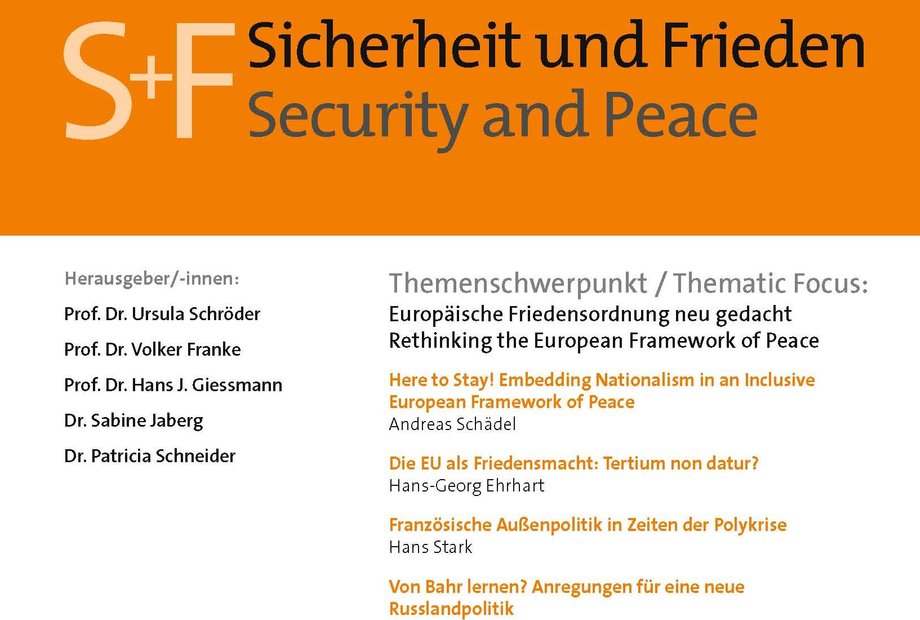"Europe is at a crossroads." This rather overworked phrase – used in so many speeches over the past few years – aptly encapsulates the current political situation, which demands our full attention. Perplexity is spreading in the face of a whole bundle of worrying trends, which have led to disillusionment and increasing helplessness, especially in Western Europe. The vision of a peace community from the Atlantic to the Urals seems to have disappeared. Have today’s decision makers forgotten the lessons of the Cold War? Is there no one anymore who remembers the disastrous dynamics of the security dilemma created by the rampant arms race in the East-West conflict? The situation has become more complex, making it more difficult to master the challenges posed by globalization and structural change. Irrespective of the changed circumstances, the Neue Ostpolitik of the 1960s has something in common with the present: the need for bold thinking and the courage for peace needed to put it into practice against the spirit of the times. This is where the thematic focus, edited by Hans-Joachim Giessmann, begins.
Andreas Schädel takes a critical look at the driving forces behind the current wave of nationalist politics in Europe, which he describes as a product of the inability to develop common perspectives. In this respect, criticism of a renationalization alone cannot provide a remedy. What is needed instead is a convincing counter-project, which the author sees in the concept of an “integrative identity” based on liberal, inclusive and cooperative principles.
Hans-Georg Ehrhart addresses Europe's field of tension between the alternatives of a military and civil power and the question of whether and how Europe, under the changed conditions, can muster the determination to create a peace power with global responsibility. In the absence of better alternatives, the author sees the European Union in particular as having a duty to continue along this path.
Hans Stark sees the critical state of the Franco-German tandem as an expression of the current crisis of the world order that emerged after the end of the Second World War and admonishes German politicians in particular not to miss out on the opportunities for shaping European policy through a strong Franco-German relationship.
Mathias Dembinski and Vera Rogova draw an arc to Willy Brandt’s and Egon Bahr’s Neue Ostpolitik and fear that if the Federal Republic of Germany confines itself to a role of mediator between conflicting interests in Europe, there would be hardly any room for courageous eastern political initiatives. They remind us of Egon Bahr’s dictum that a change in the status quo presupposes recognition of emerging realities.
Martin Wählisch takes a look beyond the borders of Europe to the southeast. He recalls the European preparatory work for the development of multilateral security dialogues and cooperation and refers to the successful cooperation of the E3 (France, Great Britain and Germany) in the negotiation of the nuclear agreement with Iran until the withdrawal of the USA. His analysis focuses on the opportunities for multilateral security cooperation in the Gulf.
Finally, the essay by the editor responsible for the thematic focus, Hans-Joachim Giessmann, deals among other things, with the expanded dimension of peace policy responsibility. Today, Europe is more than a union of states; it is above all a community of citizens and their societies. If the political elites in these societies prove unable to develop an effective peace and security order, it is up to civil society to demand this and make its own contribution. The focus will be completed with a discussion of new titles on the topic.
Outside the thematic focus, Richard Vogt is concerned with the ecological, economic and geopolitical challenges facing the Pacific islands.
Patricia Schneider, Fangu Sun and Steve Wood examine European, Australian and Chinese perspectives on the regional and global world order.
Contact: Patricia Schneider: schneider@ifsh.de.
For more information click here: www.sicherheit-und-frieden.nomos.de/?L=1





